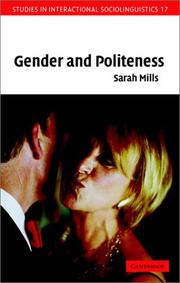| Listing 1 - 3 of 3 |
Sort by
|
Book
ISBN: 3631399782 Year: 2003 Publisher: Frankfurt am Main : Peter Lang,
Abstract | Keywords | Export | Availability | Bookmark
 Loading...
Loading...Choose an application
- Reference Manager
- EndNote
- RefWorks (Direct export to RefWorks)
Grammar --- Sociolinguistics --- Courtesy --- Discourse analysis --- Grammar, Comparative and general --- Pragmatics --- Pragmalinguistics --- General semantics --- Language and languages --- Logic, Symbolic and mathematical --- Semantics (Philosophy) --- Particles (Grammar) --- Discourse grammar --- Text grammar --- Semantics --- Semiotics --- Civility --- Courteous behavior --- Courteousness --- Discourteous behavior --- Discourteousness --- Graciousness --- Impoliteness --- Manners --- Polite behavior --- Politeness --- Rudeness --- Ungraciousness --- Etiquette --- Particles --- Philosophy --- Function words --- Grammar, Comparative and general Particles --- Allemand (langue) --- Grammaire comparée et générale --- Formules de politesse --- Analyse du discours --- Pragmatique --- Particules

ISBN: 1281125717 9786611125714 0226310566 9780226310565 9780226310534 0226310531 9780226310558 0226310558 9781281125712 661112571X Year: 2003 Publisher: Chicago University of Chicago Press
Abstract | Keywords | Export | Availability | Bookmark
 Loading...
Loading...Choose an application
- Reference Manager
- EndNote
- RefWorks (Direct export to RefWorks)
When eleven-year-old Lavinia Guasca began her new life as a lady-in-waiting at the court of Turin, she brought with her a parting gift from her father Annibal (1540-1619): a detailed guidebook he wrote to help steer her through the many pitfalls of court life. Lavinia had her father's Discourse published in 1586; this English translation is the first version published in any form since that time. The Discourse displays an incredibly far-sighted view of women's education. Annibal thought gifted young girls should develop their talents and apply them to careers outside the home. In the Discourse, he details the unique and extremely rigorous educational program to which he had subjected Lavinia almost from the cradle with this end in mind. To complete Lavinia's education, Annibal filled the Discourse with advice on spirituality and morality, health and beauty, and how to behave at court-everything a well-bred lady-in-waiting would need to know. This edition also includes an appendix that traces the later events of Lavinia's life through excerpts from her father's letters.
Conduct of life --- Women --- Courtesy. --- Courts and courtiers. --- Ladies-in-waiting --- Courts and courtiers --- Queens --- Court and courtiers --- Courtiers --- Kings and rulers --- Manners and customs --- Favorites, Royal --- Civility --- Courteous behavior --- Courteousness --- Discourteous behavior --- Discourteousness --- Graciousness --- Impoliteness --- Manners --- Polite behavior --- Politeness --- Rudeness --- Ungraciousness --- Etiquette --- Conduct of life. --- Guasco, Lavinia, --- Lavinia, --- Early works to 1900 --- Courtesy --- Guasco, Lavinia --- Italy --- relationships, family, familial, father, children, parents, lady in waiting, court, courtly, royalty, aristocrat, aristocracy, society, social studies, turin, guidebook, italian, italy, translation, 1500s, renaissance, middle ages, medieval, history, historical, education, educational, womens, woman, feminism, career, teaching, discussion, health, behavior, conduct.

ISBN: 1107132436 1282486829 9786612486821 0511673779 0511671717 0511674961 0511670435 051161523X 0511672985 9780511674969 9780511671715 0521810841 0521009197 9780521810845 9780521009195 9780511615238 9780511672989 9780511670435 Year: 2003 Publisher: Cambridge New York Cambridge University Press
Abstract | Keywords | Export | Availability | Bookmark
 Loading...
Loading...Choose an application
- Reference Manager
- EndNote
- RefWorks (Direct export to RefWorks)
Gender and Politeness challenges the notion that women are necessarily always more polite than men as much of the language and gender literature claims. Sara Mills discusses the complex relations between gender and politeness and argues that although there are circumstances when women speakers, drawing on stereotypes of femininity to guide their behaviour, will appear to be acting in a more polite way than men, there are many circumstances where women will act just as impolitely as men. The book aims to show that politeness and impoliteness are in essence judgements about another's interventions in an interaction and about that person as whole, and are not simple classifications of particular types of speech. Drawing on the notion of community of practice Mills examines the way that speakers negotiate with what they perceive to be gendered stereotypes circulating within their particular group.
Language and languages --- Courtesy --- Sociolinguistics. --- Language and sex --- Sexism in language --- Language and society --- Society and language --- Sociology of language --- Language and culture --- Linguistics --- Sociology --- Integrational linguistics (Oxford school) --- Civility --- Courteous behavior --- Courteousness --- Discourteous behavior --- Discourteousness --- Graciousness --- Impoliteness --- Manners --- Polite behavior --- Politeness --- Rudeness --- Ungraciousness --- Etiquette --- Sex differences. --- Social aspects --- Sociological aspects --- Sociolinguistics --- Sex differences --- Sociology of the family. Sociology of sexuality --- Pragmatics --- Arts and Humanities --- Language & Linguistics --- FORMULES DE POLITESSE --- LANGAGE ET LANGUES --- FEMMES --- ANGLAIS (LANGUE) --- DIFFERENCES ENTRE SEXES --- LANGAGE --- Langage --- Différences entre sexes
| Listing 1 - 3 of 3 |
Sort by
|

 Search
Search Feedback
Feedback About UniCat
About UniCat  Help
Help News
News